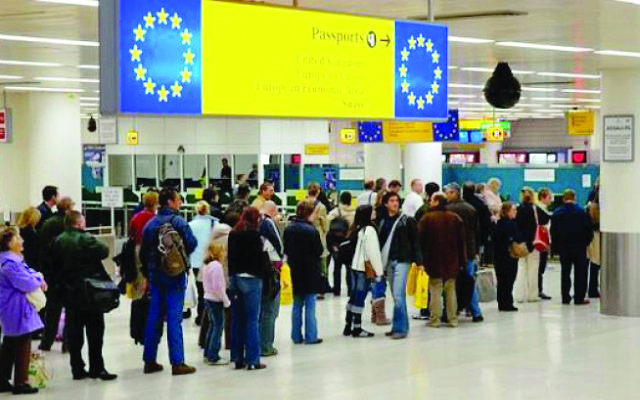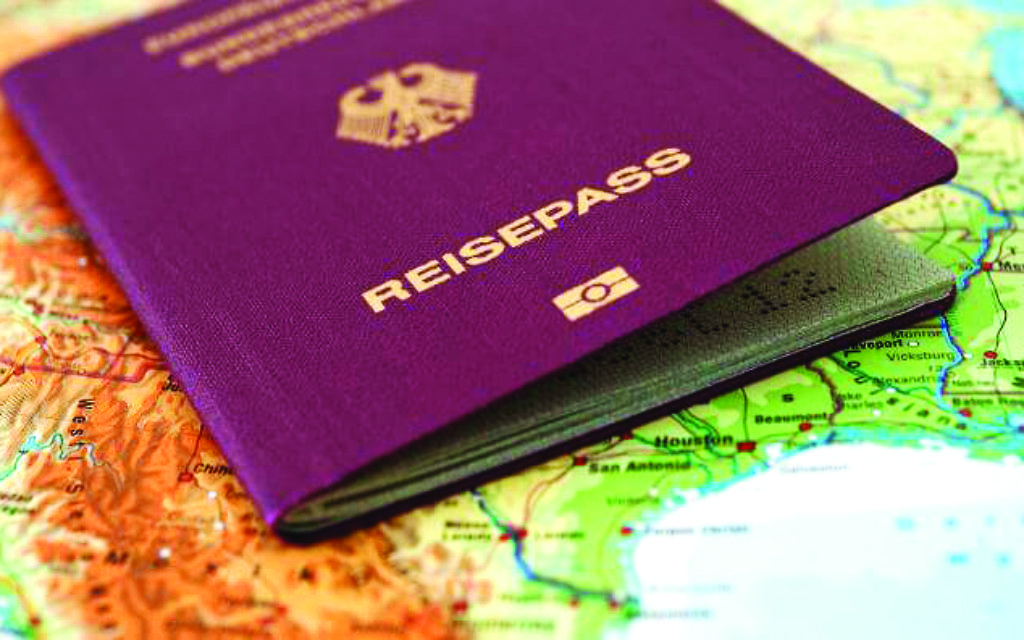Do you want an EU passport?
Passportia, a company set up in 2013 specialising in citizenship law, has seen a huge increase in the numbers of people contacting it for help in obtaining an EU passport
Jeff’s four grandparents had all been murdered in 1942 by the Nazis, so he was perhaps an unlikely candidate to apply for German citizenship. His parents had been lucky enough to escape Germany on the Kindertransport and they had met later, in England, where they set up a factory employing other Jewish refugees.
But Jeff is one of many people – among them a large proportion of Jews – who, just before, and definitely since, the Brexit vote, began to look into whether they could get an EU passport. Jeff, and others, are researching if they can reclaim German citizenship from ancestors who left or fled persecution.
But obtaining the documention (birth or marriage certificates) and details from German authorities can be tricky and time consuming, especially if you don’t speak German.
Get The Jewish News Daily Edition by email and never miss our top stories Free Sign Up
Passportia, a company set up in 2013 specialising in citizenship law, can help. It provides legal advice for applications for citizenship of the UK, Germany and Ireland, and is familiar with cases where the applicant has ancestral or family connections.
“Applications for German citizenship now account for more than half Passportia’s work,” explains founder Bruce Mennell.

AleArest“I did a test case in early 2016 for restoration of German citizenship that had complications, but went very well.” The two types of enquiry Passportia mostly deals with is where a person is already eligible, typically through a German parent, grandparent or great grandparent, or where a person would have been eligible had their German ancestors not lost their citizenship or lives due to Nazi oppression.
The restoration the company applies for is under Article 116 of the German constitution of 1949, which says: ‘Former German citizens who between 30 January 1933 and 8 May 1945 were deprived of their citizenship on political, racial or religious grounds and their descendants shall, on application have their citizenship restored.’
However, this is not always as straightforward as it seems and some people fall outside of Article 116, the implementation of which was made more restrictive by court judgements in the 1980s. Others still are unable to source the necessary documents, which are often stored at local level in Germany, Poland, the Czech Republic or other Eastern European countries, and have trouble finding proof that their ancestor was in fact a German citizen.
“If we can’t locate primary evidence, we’ll try to build a case based on secondary evidence,” says Mennell. “We have a comprehensive set of laws, judgements and commentary, so we can work around people in a borderline situation. We prepare the application very thoroughly, and our case workers speak German, so we have a higher chance of success .”
The company carries out pre-screening to ensure the prospective client has a reasonable basis to qualify for German citizenship. If they do, they are invited for a consultation where the strength of their case will be established and after being given the go-ahead to act, they build the case.
The company claims a 90 percent success rate for obtaining citizenship. “So far we’ve never had a refusal,” affirms Mennell. While he and his caseworkers don’t usually ask clients their motivations for wanting EU citizenship, sometimes the clients tell them.
“The main reason is to maintain the ability to live, work and travel in the EU. There are benefits of dual passports for business people as some countries don’t require a visa if you have a German passport.
“Sometimes they want it for children – to keep their options open – and maybe they have some anxiety as to what the future of Britain holds as there is uncertainty,” he says.
“For others, they want to assert their identification with the EU, and sometimes we get people who have some kind of cultural interest in or connection with Germany – they’re Jewish, their link is a grandparent, they can speak some German… It’s a minority, but it’s more people than I was expecting,” Mennell admits.
His caseworkers have heard some “extraordinary” stories of escape from clients whose German ancestors were hidden in other countries during the Second World War, while others had unusual migratory patterns after leaving.
“We hear many stories where people experience loss and have escaped or emigrated,” Mennell acknowledges. “They have survived trauma and change and demonstrated an incredible capacity to survive and adapt.”

Thank you for helping to make Jewish News the leading source of news and opinion for the UK Jewish community. Today we're asking for your invaluable help to continue putting our community first in everything we do.
For as little as £5 a month you can help sustain the vital work we do in celebrating and standing up for Jewish life in Britain.
Jewish News holds our community together and keeps us connected. Like a synagogue, it’s where people turn to feel part of something bigger. It also proudly shows the rest of Britain the vibrancy and rich culture of modern Jewish life.
You can make a quick and easy one-off or monthly contribution of £5, £10, £20 or any other sum you’re comfortable with.
100% of your donation will help us continue celebrating our community, in all its dynamic diversity...
Engaging
Being a community platform means so much more than producing a newspaper and website. One of our proudest roles is media partnering with our invaluable charities to amplify the outstanding work they do to help us all.
Celebrating
There’s no shortage of oys in the world but Jewish News takes every opportunity to celebrate the joys too, through projects like Night of Heroes, 40 Under 40 and other compelling countdowns that make the community kvell with pride.
Pioneering
In the first collaboration between media outlets from different faiths, Jewish News worked with British Muslim TV and Church Times to produce a list of young activists leading the way on interfaith understanding.
Campaigning
Royal Mail issued a stamp honouring Holocaust hero Sir Nicholas Winton after a Jewish News campaign attracted more than 100,000 backers. Jewish Newsalso produces special editions of the paper highlighting pressing issues including mental health and Holocaust remembrance.
Easy access
In an age when news is readily accessible, Jewish News provides high-quality content free online and offline, removing any financial barriers to connecting people.
Voice of our community to wider society
The Jewish News team regularly appears on TV, radio and on the pages of the national press to comment on stories about the Jewish community. Easy access to the paper on the streets of London also means Jewish News provides an invaluable window into the community for the country at large.
We hope you agree all this is worth preserving.
-
By Laurent Vaughan - Senior Associate (Bishop & Sewell Solicitors)
-
By Laurent Vaughan - Senior Associate (Bishop & Sewell Solicitors)
-
By Laurent Vaughan - Senior Associate (Bishop & Sewell Solicitors)
-
By Laurent Vaughan - Senior Associate (Bishop & Sewell Solicitors)






















